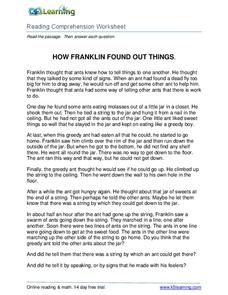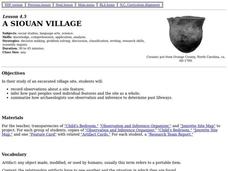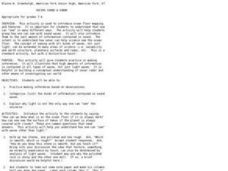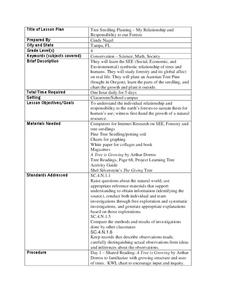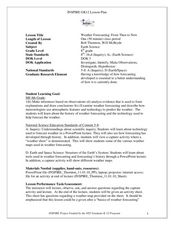Bethel School District
Observations and Inference
What's the difference between qualitative and quantitative observations? Learners make observations, inferences, and predictions about their environment with a set of questions and activities that are applicable to either language...
EngageNY
Building Background Knowledge and Making Inferences: What Is a Natural Disaster?
That's a disaster! Scholars complete a gallery walk to view images and make inferences about natural disasters. They fill out a note catcher about what they observe and infer any questions they may have. They then participate in a World...
EngageNY
Making Inferences About Informational Text: Science Talk on How My Insect Contributes to the Rainforest Ecosystem
We need to talk. Learners participate in a science talk by discussing the idea of how insects are important to the rainforest. They record notes about their conversations as they talk. For homework, pupils add to their field journals.
K5 Learning
How Franklin Found Out Things
Franklin learns about the world by making observations, and so do we! A short reading assignment prompts fourth graders to answer comprehension questions about a curious boy and what he notices.
Curated OER
Red, Green, and Blue Mystery Liquids! Hypothesis or Inference?
Eighth graders are actively involved in the scientific method and inquiry as they form quick hypotheses based upon a teacher set of mystery liquids. They determine the need to make additional observations of the liquids.
Curated OER
A Siouan Village
Fourth graders examine the artifacts obtained from an excavated Siouan village site. They make inferences about the people who once lived there based on the artifacts and complete a Research Team Report.
Curated OER
Motel of Mysteries
Students determine that even though inferences are based on observations that does not mean they are always true or correct. They pull the topics and main ideas out of a piece of difficult text.
Curated OER
Crickets Guided Discovery
Sixth graders investigate insect anatomy by analyzing a live cricket. In this insect science instructional activity, 6th graders discuss their knowledge of insects and describe their characteristics from memory. Students...
Have Fun Teaching
Growing Seeds (9)
A seed, water, and sunlight. A seed, water, but no sunlight. A seed, sunlight, but no water. Young biologists are ask to infer what will happen to seeds given five different growing conditions.
Curated OER
Seeing Sound & Sonar
Students make inferences based on different sounds that they hear. In this inferences lesson plan, students will hear sounds of different objects and describe the sounds based on what they hear. They will answer various questions about...
Curated OER
Cooler in the Shadows
Students explore Earth science by creating a scale model in class. In this shadow lesson, students research the impact the sun has on Earth shadows and complete a space science worksheet. Students create models of the Sun and Earth and...
Curated OER
Tree Seedling Planting- My Relationship and Responsibility to our Forests
In this trees lesson, 4th graders read the book, A Tree is Growing and complete a KWL chart on how trees grow and how they are used. Students research the symbiotic relationship of humans and trees, create tree collages, plant a...
Curated OER
QuickPlan: Mystery Boxes
Primaries explore the concepts of observation and inference. Given a set of six sealed boxes, children lift, tip, or gently shake in order to make observations about what is inside. The lesson plan gives preparation instructions in...
Curated OER
Unwind: Directed Reading Thinking Activity
To generate interest in reading Neal Shusterman's young adult science fiction novel Unwind, class members engage in a Directed Reading-Thinking Activity (DRTA) that asks them to examine the front and back covers, the blurbs, and "The...
Curated OER
Classification of Animals
Students explore animal characteristics by participating in a SMART board activity. In this animal classification lesson, students utilize a sorting chart to divide different animal names by their observable characteristics. Students...
Curated OER
Hero Or Zero?
Students investigate science and technology by reading a children's book. In this reading comprehension lesson, students read the story Archibald Frisby and discuss the ways we use science and technology in everyday life....
Curated OER
Weather Forecasting: From Then to Now
Eighth graders review the history of weather forecasting. In this earth science lesson, 8th graders identify the different tools used in forecasting weather. They explain why it's important to know the weather.
Curated OER
Systems Working Together
Fourth graders practice reading in the content areas (science) in order to explore the interdependence of the body systems. They answer written questions after reading.
Curated OER
In Touch with Apples
Students read "How To Make an Apple Pie and See the World", the story of a girl who traveled the world to find the ingredients to make her apple pie. They conduct a series of interdisciplinary activities including testing their senses,...
Curated OER
Weather Proverbs
Define and write proverbs! Learners define proverbs, use the Internet to find weather-related proverbs, and talk with their parents to learn other proverbs. There's a well-structured worksheet included here.
Curated OER
What's The Big Deal About Accutane?
Young scholars take on the role of epidemiologists. They investigate an "outbreak" in serious birth defects that occur in infants born to teenage girls. students discover a link between the use of the acne drug called Accutane and birth...
Curated OER
Leach Out and Touch Someone
Students discuss how groundwater becomes polluted. In groups, they design and create models of groundwater pollution sources. They demonstrate to the class how the water may become contaminated from local and nonlocal pollution sources.
Curated OER
Chocolate Fever
Students study plants in the rainforest. They complete a variety of activities surrounding the subject of chocolate. They create new candy bars, invent learning games and write poetry--all focusing on chocolate.
Curated OER
The Science Of Mummies
High schoolers explore how new advancements in technology can lead to advancements in scientific knowledge, and specifically how new technologies are advancing the study of mummies.





